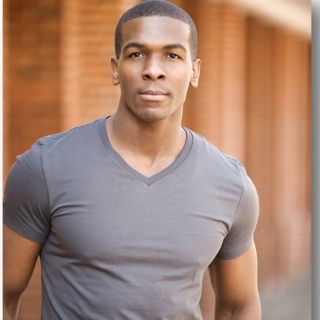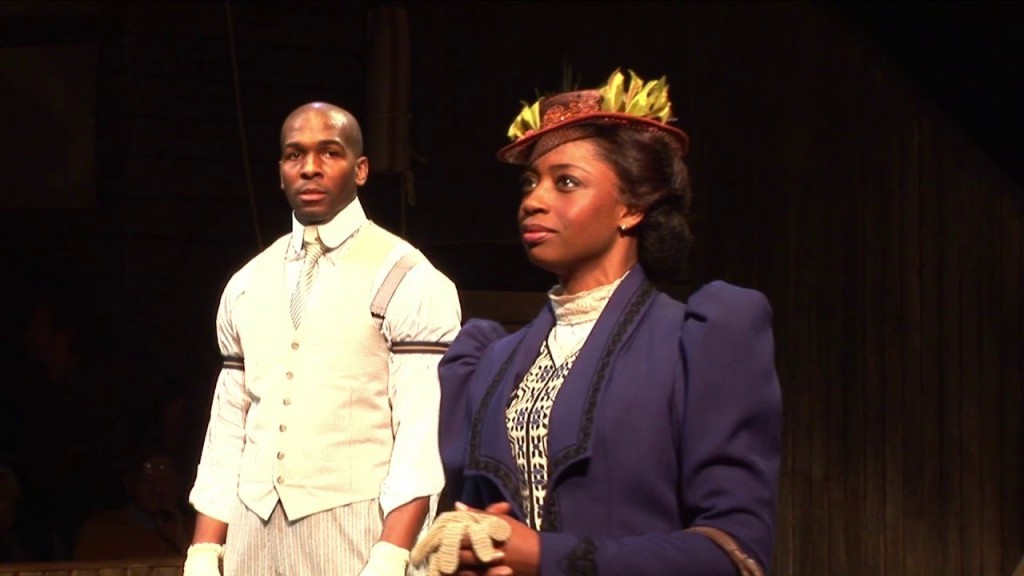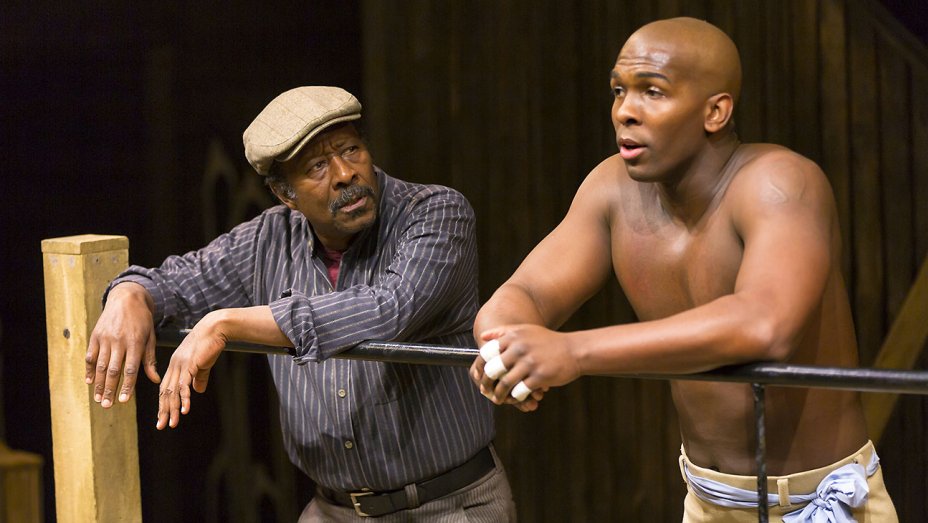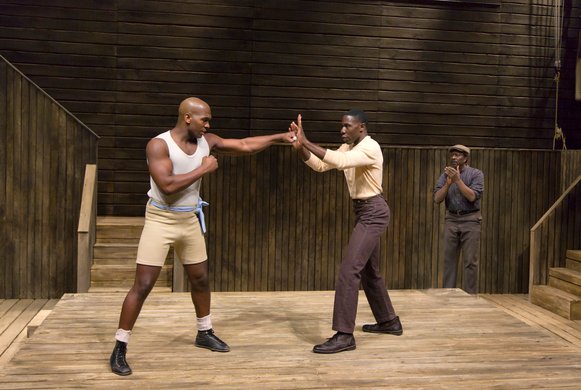Production photos by T. Charles Erickson
Sports aren’t exactly my ministry. When I read that Marco Ramirez’s, The Royale, is based on the story of Jack Johnson, the first African-American Heavyweight Champion of the world, let’s just say my heart didn’t exactly leap with excitement.
 But let me tell you! What’s going on at The Lincoln Center is way more than a boxing match. It’s a heart-breaking pursuit of passion with opponents greater than any title that could be won.
But let me tell you! What’s going on at The Lincoln Center is way more than a boxing match. It’s a heart-breaking pursuit of passion with opponents greater than any title that could be won.
It is rhythmic. It is theatrical. It is a fresh take on story telling. Truly a must see.
I recently had the chance to chat with leading actor, Khris Davis about his New York debut in The Royale. Here’s what he had to say.
Broadway Black (BB): I’m curious to hear about your initial reaction to The Royale and reading the script. When did you know you needed to do this?
Khris Davis (KD): I knew I needed to do it when I read it because there were a lot of things in the script that were important to me an African in America. Although this took place in 1905-1910, and I was only born in the 80s, there were many things that I thought my mom, my aunts, and my cousins went through. We’re still fighting to be seen. We’re Africans in America who want to be seen as normal people who do great things. You hear things like ‘for a black person you’re pretty dope.’ You know, ‘you’re pretty for a dark skin chick.’ You just want to hear that you’re pretty. You’re tired of hearing that sh*t. You don’t want to hear that you’re secluded.
BB: Yes, you’re speaking to the choir.
KD: Yea, you know I heard that too when growing up. One thing we don’t talk about a lot is color complex within the black community. Being a dark skin person, you hear a lot of crazy things. Not just from outside of the culture, but from within the culture. Seeing that schema in 1905 to now—that really stuck out to me. I watched this documentary and I saw that the New York Times was about to make a post, making a mockery of Jack Johnson. It said ‘for a black person or for a negro in America to overcome a white man is nearly impossible because they have larger frontal lobes, they’re not that intelligent.’ He fought through that and succeeded. So I feel it is important to seen this story, on this stage, in the epicenter of theater in America.
BB: One overarching theme that I’m getting from the show is the desire to be and have the best, in every aspect in life… and the consequences that come along with that. My question for you is how does race and the time period of the show affect this and how is this still relevant today?
KD: We can talk about our current president. He is for all intents and purposes the best president we’ve had for people as a whole. He has received so much opposition and it’s not his viewpoints, it’s the color of his skin. He’s just being the best he can be. He never plays his race card, he never brings it up. That’s just like Jack Johnson. At his time no black man was ever able to fight a white heavyweight champion. And what did he do, he ended up beating the white heavyweight champion and got in the newspaper. He bruised white masculinity and white America. It was staggering for them. He gave hope to the black community that we can climb over that wall of racism and that the color line isn’t as real as they make it seem.

BB: Exposure. His fight to become the best in all aspects gave him and, in turn, the achievements of blacks, exposure.
KD: Yes. We did have W.E.B. Dubois, Booker T Washington, and Marcus Garvey at this time, but on a main stream, to cross the color line like that was super huge. He crossed the line in relationships, where he chose to live, who he chose to hang out with, all because he wanted to be the best.
When I read this play, I was thinking, we still are trying to see more of our black faces respected for the films we’re trying to produce. Truly, on the top level, we are still fighting to see a movie being nominated. We want to share our current black experience because we are just people living. We are humans too and we have a shared experience here in this county.
BB: Absolutely. I’m so happy that The Royale, and this story you’re telling is part of a larger season on and off Broadway. We still have a far way to go, but in comparison to #OscarsSoWhite and the issues that we are still having to address in Hollywood, there are so many great performances that may pan out for this theatre award season to be more representative of the work WE are doing.
KD: Yes, it’s really exciting with The Color Purple, Head of Passes..
BB: Shuffle Along, Familiar, Eclipsed!
KD: I think it’s really important that we’re telling stories like this. And we’re doing so well.
BB: The show is in a very intimate theater, so I know you can see a lot from the stage. What do you see and feel audiences are really resonating with and what, perhaps, are they missing?
KD: I think a lot of times you have audiences members who come in and they are bracing themselves for something from the door, rather than coming in with an open spirit to experience something moment by moment. So me and the other cast members, because we trust each other so much, really buckle down and tell the story together. And we make it to the end.
Whether the audience is super lively or super quiet, they’re all receiving the same message. I think they’re all being affected. Which to me, makes me very happy. All I want is for people to see themselves.

BB: I’m a professional people watcher, and when I took a moment to scan the audience from time to time I came to the same conclusion. I think people are so engaged. It’s a fresh show. I haven’t seen something (in a long time) where the characters so effectively tell the story with minimal props and set changes, other than The Color Purple. It really allows for the audience to lean into the story. I saw people wiping tears from their eyes. It’s very real. The story transcends race. It’s very specific, but very universal.
KD: Yes. Good.
BB: Now, I do want to talk about your cast. Everyone truly packs a punch. McKinley Belcher III, Clark Peters, Montego Glover, John Lavalle. How has it been working with them?
KD: It’s actually been really, really, really, good. We had a about 2.5 weeks of rehearsal before we had tech, so we got in and I think we had our script in hand for maybe two days and everyone was on one track, riding together to move this forward–so professional and so prepared. We got the chance to really mold this story the way we wanted to. We’ve been jellying and really just putting the juice on it from day one. I’m working with some serious, serious professionals.
BB: Yes, I was so impressed with everyone. Congrats to you on making your NY stage debut.
BB: What have you enjoyed most about your experience working with the show? How have you grown?
KD: You do shows here and you do shows there, and shows come and go. One thing that doesn’t always happen is when you get to tell truly impactful stories and also love everyone you work with. And those are moments that happen in the performers life, that change your life. For me, the experience that I’ve had with these brothers and this sister, and my writer and director, it has literally been a family environment. There was so much love that happened from the door. Telling this story and making this story happen, this important story that I also fell in love with, was so easy and it was life changing. I will forever be changed by this experience. You get a couple of those in my life. This is one that God has blessed me with.
BB: Then thank him! Yes God!
KD: It’s good, it’s so good. When I read it I just wanted to be part of it, one way or another. Let me tell this story. It’s a good one.
BB: Well you’re telling it. Congrats again.
The Royale, directed by Rachel Chavkin, opened March 7, 2016. Catch this seasons’ most significant match through May 1, 2016 at The Lincoln Center. In the meantime, check out the Schomberg Talks discussion moderated by Founder & Editorial Director, Andrew Shade. For more info and to purchase tickets click here.




Pingback: The Royale & More Announced For Drama Desk Award Nominations
Pingback: Nyong'o, Brooks, & More Shine at the 2016 Theatre World Awards